Your Guide to Christmas in Portugal
Experience the warmth and joy of the holiday season in Portugal with our comprehensive guide to Christmas in Portugal. From traditional events and festivities to unique food-related customs and cultural celebrations, explore all that this beautiful country has to offer during this magical time of year.
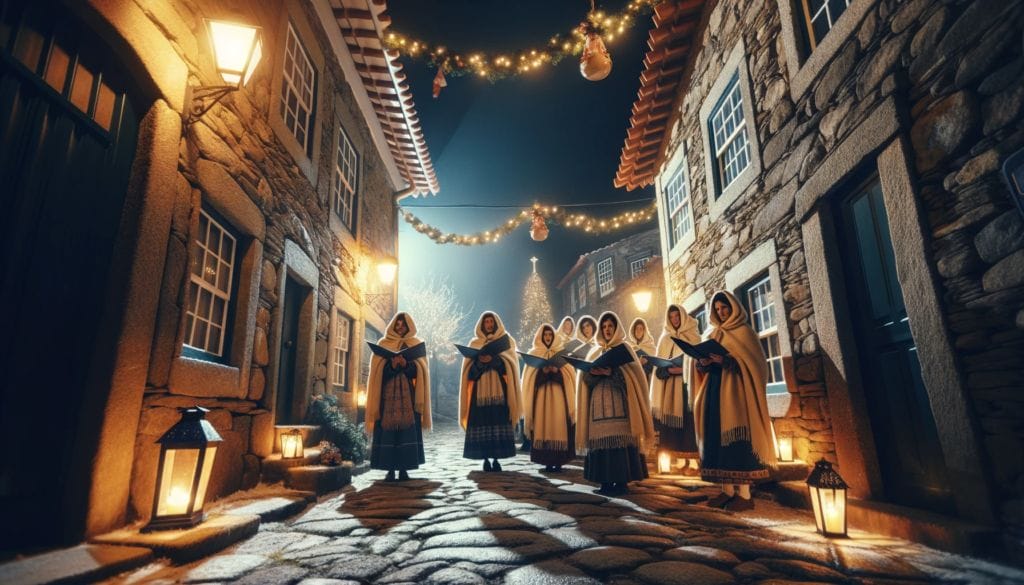
Discover the charming Christmas fairs and markets in Porto, immerse yourself in the lively Alentejo December fairs, and don’t miss the enchanting Madeira’s Night of the Market.
Attend the exciting Christmas events across Portugal, from the stunning Festive Lisbon lights to the Santa Claus parade in the streets. Indulge in the famous Bacalhau Christmas dinner, savor the mouthwatering Portuguese holiday desserts, and partake in the traditional Consoda and Consoada, breakfast, and Christmas Eve meal respectively.
Key Takeaways
- Experience the warmth and joy of the holiday season in Portugal.
- Discover the charming Christmas fairs and markets in Porto, the Alentejo December fairs, and Madeira’s Night of the Market.
- Attend exciting Christmas events such as the Festive Lisbon lights, Algarve Christmas festivities, and Santa Claus parade.
- Indulge in the famous Bacalhau Christmas dinner and savor the mouthwatering Portuguese holiday desserts.
- Explore the unique Christmas traditions and customs in Portugal, including the Janeiras, Santo Estêvão, and Missa do Galo.
What Makes Christmas in Portugal Special?
Christmas in Portugal is a blend of warmth and European tradition, twinkling against the backdrop of winter’s embrace. It’s the time when families come together, sharing in age-old customs that make the holiday uniquely Portuguese. From the streets adorned with festive lights to the sound of carols that fill the air, each element weaves a sense of community and joy.
One of the most heartfelt traditions is the creation of the ‘Presépio‘, elaborate Nativity scenes that go beyond Mary, Joseph, and the baby Jesus, including entire villages that tell a story of their own. Homes and churches proudly display these scenes, inviting everyone to witness the artistry and care put into them.
Food plays a central role in Portugal’s Christmas celebrations. The Christmas Eve feast, ‘Consoada‘, offers a table laden with dishes like ‘Bacalhau‘, the cherished codfish, and a variety of sweets like ‘Bolo Rei‘, a king’s cake adorned with crystallized fruits.
But it’s not just about what is eaten; it’s about the gathering of generations, where stories are shared, and laughter echoes through the halls. After the feast, many attend the ‘Missa do Galo’, the Midnight Mass, a spiritual anchor for the festivities. As the bells chime to announce Christmas Day, the air fills with a sense of renewal and togetherness, capturing the spirit of Christmas in Portugal.
The History of Christmas in Portugal
Christmas in Portugal is deeply entwined with the country’s rich religious heritage and the festivities that have been passed down through generations. The celebration of Christmas has its roots in the Roman Catholic tradition, which has been the predominant religion in Portugal for centuries.
This foundation laid the groundwork for the unique blend of solemn religious observance and vibrant local customs that characterize the Portuguese Christmas. Early festivities were primarily religious, focusing on the birth of Jesus Christ.
Over time, these celebrations incorporated local flavors and rituals, creating a distinct cultural tapestry. The ‘Presépio‘, or Nativity scene, evolved from simple representations to elaborate displays depicting life in Portuguese villages, echoing the country’s strong connection to community and faith.
As Portugal navigated through different historical periods, including the Age of Discoveries and various political regimes, the essence of Christmas adapted, reflecting the changing times. The introduction of exotic fruits and spices from the New World, such as the now-traditional ‘Bolo Rei’, a cake symbolizing the Epiphany, enriched the festive cuisine.
In more recent times, the end of the Estado Novo regime and the subsequent increase in global interactions have brought new layers to the Christmas customs, integrating more secular and international practices.
However, even with these influences, the heart of Christmas in Portugal remains steadfast in its celebration of family, community, and shared history, with each generation adding its own brushstrokes to the ongoing narrative of the Portuguese Christmas.
Fairs and Markets in Portugal
Experience the festive ambiance of Christmas markets and fairs in Portugal. The country boasts a range of events and festivities throughout December, showcasing local traditions and culture. From the charming Porto holiday markets to the unique Alentejo December fairs, and the enchanting Madeira’s Night of the Market, Portugal has something for everyone.
Here’s a listing some of the most important Christmas fairs and markets in Portugal, organized by city:
| City | Christmas Fair/Market |
|---|---|
| Lisbon | Wonderland Lisboa |
| Porto | Mercado de Natal do Porto |
| Braga | Braga Christmas Market |
| Obidos | Óbidos Vila Natal |
| Faro | Mercado de Natal de Faro |
| Coimbra | Feira de Artesanato de Natal |
| Viseu | Natal em Viseu |
| Funchal, Madeira | Natal no Mercado |
| Guimarães | Guimarães Christmas Market |
| Cascais | Mercado de Natal de Cascais |
Visiting a Portuguese Christmas market is a delightful experience that immerses you in the festive spirit of the season. You can expect to find a vibrant atmosphere filled with the warm glow of twinkling lights and the joyful sounds of Christmas carols.
Traditional wooden stalls are brimming with handcrafted goods, including intricate ornaments, festive decorations, and unique gifts. Local artisans proudly display their crafts, offering everything from handmade knitwear to ceramic ware.
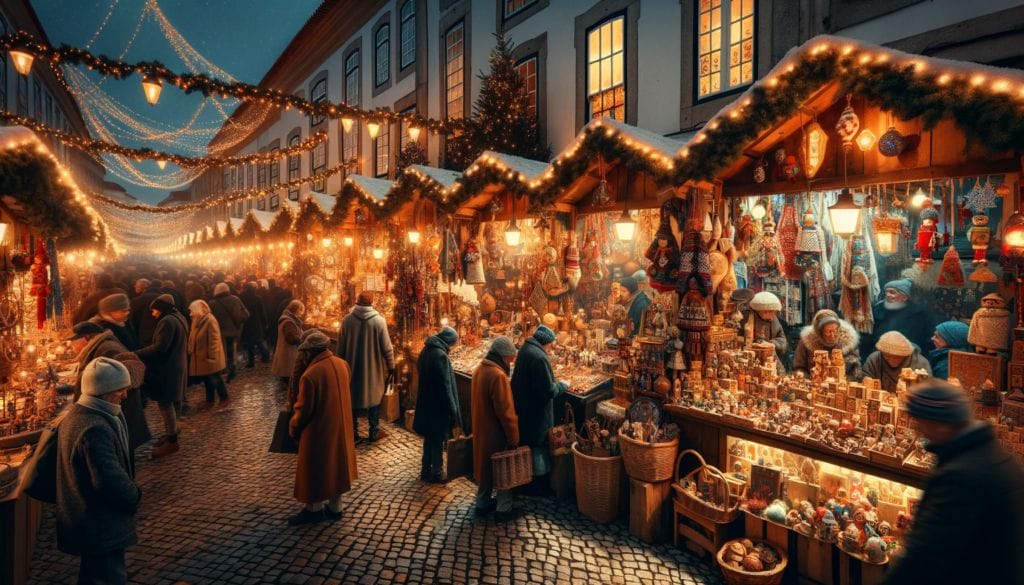
The air is scented with the aromas of seasonal treats like roasted chestnuts, sugary almonds, and the rich, spicy scent of mulled wine. Food vendors serve up hearty Portuguese cuisine, with regional specialties and holiday favorites such as ‘Bacalhau’, the traditional Christmas cod, and ‘Bolo Rei’, a king’s cake adorned with crystallized fruits.
For those with a sweet tooth, there’s an array of pastries and confections to sample, including the beloved ‘filhoses’ and ‘rabanadas’, which are similar to fried bread or French toast.
Beyond shopping and dining, many markets also feature entertainment such as live music, folk dances, and activities for children. The markets are not just a place to buy but to experience the communal joy of Christmas, the Portuguese way. Whether it’s in the historic squares of Lisbon and Porto or the festive island of Madeira, a visit to a Portuguese Christmas market is an enchanting and memorable part of the holiday season.
Traditional Christmas Foods
Christmas time in Portugal brings with it a delightful spread of traditional foods and drinks that fill the festive tables. The star of the holiday feast is often the ‘Bacalhau’, a dried and salted cod dish, traditionally served with potatoes, cabbage, and boiled eggs.
Bacalhau Christmas Dinner Recipe
One of the most famous dishes of the holiday season is the Bacalhau Christmas dinner, which features salted codfish served with boiled potatoes, cabbage, and other vegetables. This is a must-try for any food lover visiting Portugal during Christmas.
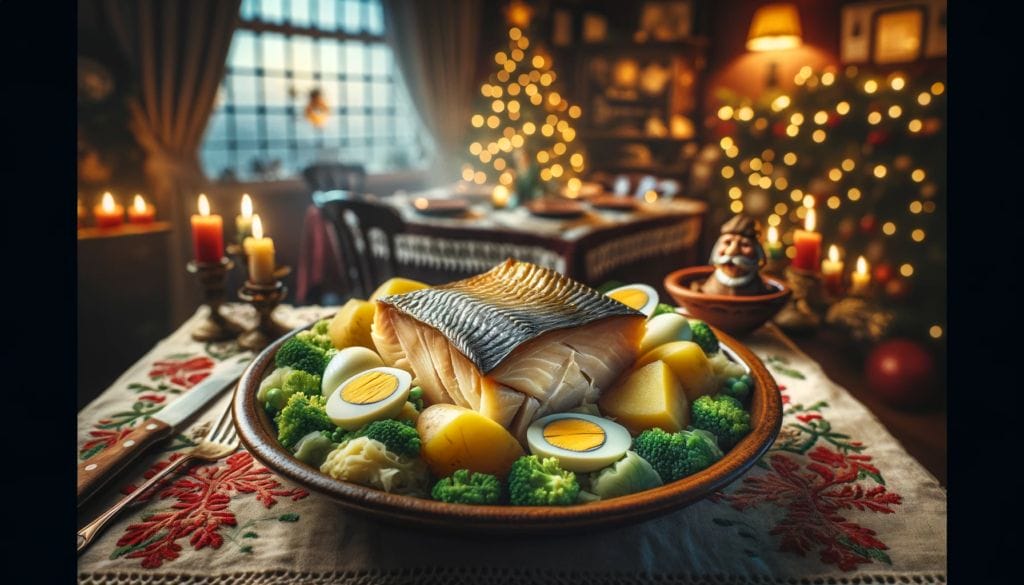
| Ingredient | Quantity |
|---|---|
| Salted codfish | 1 pound |
| Potatoes | 1 pound |
| Cabbage | 1/2 head |
| Garlic | 4 cloves |
| Olive oil | 1/2 cup |
| Onion | 1 large |
| Black olives | 1/2 cup |
| Bay leaves | 2 |
| Salt and pepper | To taste |
More Delicious Food Delights
But the delights don’t stop there. Portuguese holiday desserts are also a highlight of the season. Try the sweet and fluffy Bolo Rei, a crown-shaped cake filled with nuts and dried fruit, or the King’s cake, decorated with crystallized fruit and nuts and made with a variety of sweet fillings. These cakes are usually eaten on Christmas Day or on the night of Consoada, the Christmas Eve meal.
No Portuguese Christmas would be complete without a glass of ‘Port wine’, a sweet, fortified wine from the Douro Valley, often sipped alongside indulgent slices of ‘Queijo da Serra’, a rich, creamy cheese. These culinary traditions not only tantalize the taste buds but also gather families and friends together in celebration of the season.
If you’re lucky enough to celebrate Christmas Day in Portugal, you’ll be treated to the traditional Consoda, a breakfast feast of sweet and savory delicacies. This meal is enjoyed after midnight mass and is usually shared with family and friends.
Traditional Christmas Carols
Some of the most popular traditional Christmas carols in Portugal include “Noite Feliz” (Silent Night), “Alegrem-se os Céus e a Terra” (Joy to the World), and “O Menino está Dormindo” (The Little Boy is Sleeping).
These carols are often accompanied by traditional instruments such as the guitar, mandolin, and accordion, creating a warm and festive atmosphere.
Missa do Galo (Rooster’s Mass)
Attending the Missa do Galo, or Rooster’s Mass, is a beloved Christmas tradition in Portugal. The midnight Mass held in churches across the country marks the beginning of Christmas festivities. Legend has it that a rooster miraculously crowed at midnight when Jesus was born, announcing the good news to the world. This tradition has since been carried on for centuries.
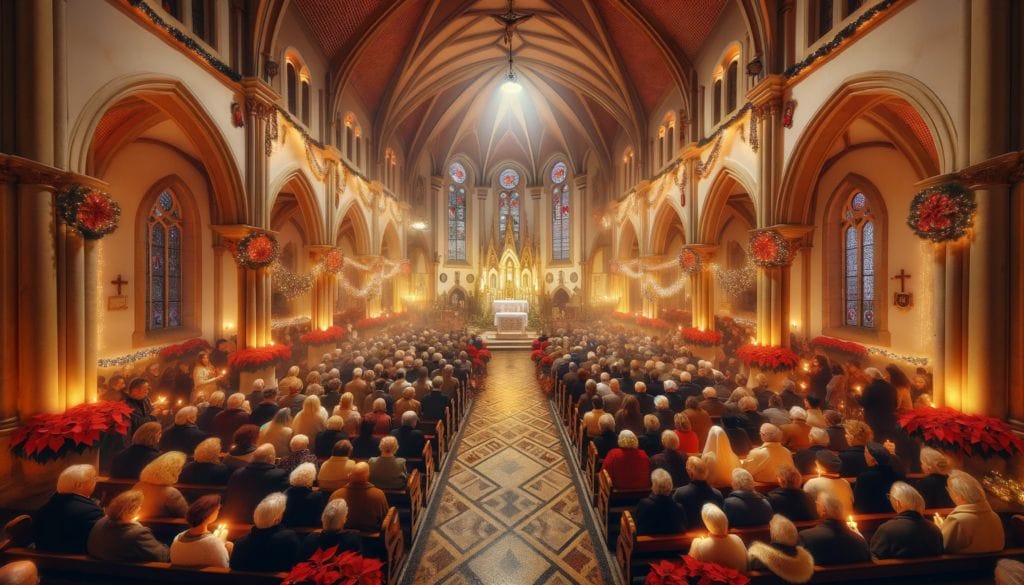
The Rooster’s Mass is a solemn and joyous occasion, with beautiful hymns and music filling the churches. You’ll see locals dressed in their finest attire, gathering with family and friends to celebrate this special event. After the Mass, small treats and sweets are often shared among the community.
“The Rooster’s Mass is a time-honored tradition in Portugal, bringing together families and communities in celebration of the birth of Jesus.”
The origins of the Rooster’s Mass date back to the 16th century. It is said that a priest was preparing for Christmas Mass when he heard the sound of a rooster crowing. He took it as a sign of divine intervention and incorporated it into the Christmas tradition. The Rooster’s Mass has since become an integral part of Christmas in Portugal, with many local communities holding their own celebrations.
The Janeiras are a way to celebrate the new year in Portugal and keep the festive spirit alive. If you have the opportunity to witness this joyful custom, don’t miss it. It’s a chance to experience the warmth and hospitality of the Portuguese people and to learn more about their traditions.
Santo Estêvão (St. Stephen’s Day Festivities)
On December 26th, Portugal celebrates Santo Estêvão, also known as St. Stephen’s Day, a joyous occasion filled with family gatherings, festive meals, and joyful activities.
The day after Christmas is traditionally a time to relax and enjoy the company of loved ones, often with a family lunch or dinner. Many families gather to enjoy the leftovers from Christmas dinner, with traditional dishes such as Bacalhau and King’s cake (Bolo Rei) taking center stage once again.
In some regions, such as the Alentejo, it is customary to take part in a pig slaughter (matança do porco) and enjoy the various pork-based dishes prepared for the occasion. Others may choose to take part in a religious procession, such as the one held in Lisbon’s Alfama neighborhood, honoring St. Stephen.
Children often participate in Santos Inocentes (Holy Innocents) by playing practical jokes on friends and family, a tradition with ancient roots that dates back to Roman times. Overall, Santo Estêvão is a time for reflecting on the joys and blessings of the past year, while looking forward to the promise of the new year ahead.
Celebrating New Year’s in Portugal
Celebrating New Year’s in Portugal is an experience that combines age-old traditions with contemporary festivities. As the clock ticks down to midnight, the streets of cities like Lisbon and Porto burst into life with spectacular fireworks displays that light up the winter sky.
Locals and visitors alike gather in main squares and along the waterfront to witness these colorful pyrotechnics. The atmosphere is electric with excitement, with people clinking glasses of sparkling Vinho Verde or warming cups of traditional spiced wine, sharing embraces and wishes for the coming year.
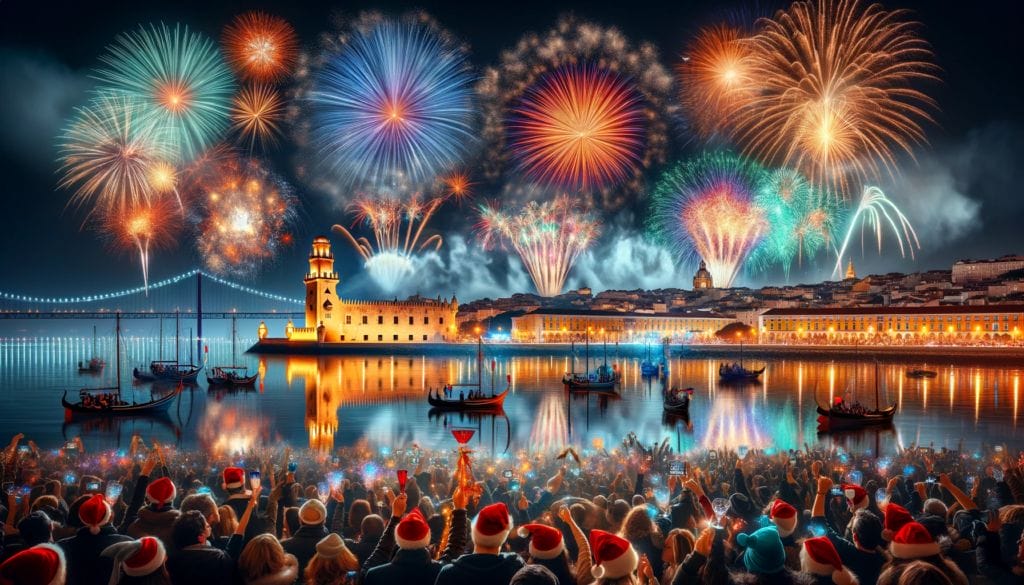
Following the fireworks, the celebrations continue with parties that last into the early hours of the morning. In homes, families and friends indulge in the customary practice of eating twelve raisins—one for each stroke of midnight and month of the year—while making silent wishes.
Concerts and street performances bring a cultural vibrancy to the festivities, and the soulful strains of Fado music often accompany more intimate gatherings. The New Year’s celebration in Portugal is not just a night of revelry but a heartfelt welcome to a year of new possibilities and the warmth of shared hopes for the future.
Countdown with Grape Eating
As the final moments of the year wane in Portugal, a delightful tradition takes center stage during the New Year’s Eve celebrations. With the approach of midnight, Portuguese people partake in a ritual of eating 12 grapes, savoring one with each stroke of the clock’s bell.
This custom, steeped in the rich cultural tapestry of the country, symbolizes a wish for prosperity and good luck in the twelve months to come. Each grape represents a different month, and it is believed that the sweetness or bitterness of each grape can predict the nature of the corresponding month. Embraced with both seriousness and mirth, this grape-eating ritual encapsulates the Portuguese spirit of hope, festivity, and the anticipation of a fruitful year ahead.
First Footing
An age-old custom in Portugal is to have the first visitor of the new year bring good luck to the household. This visitor, known as the “first footer,” is often chosen based on specific characteristics such as being tall and dark-haired. They typically bring gifts of food or drink to share with the family.
New Year’s Day Feast
On New Year’s Day, it is customary to enjoy a festive meal with family and friends. This meal often includes roast meats, seafood, and traditional Portuguese dishes such as cozido, a hearty stew.
Polar Bear Swims
In certain seaside towns and cities, daring souls dive into the chilly Atlantic Ocean on New Year’s Day. This chilly plunge, often referred to as the Polar Bear Swim, is embraced as a way to gather fortitude and vigor for the upcoming year. It’s a testament to the hardy spirit and the belief in cleansing renewal that the first day of January brings.
FAQ
What are some popular Christmas markets and fairs in Portugal?
Portugal is known for its charming holiday markets and fairs. Some popular ones include the Porto holiday markets, Alentejo December fairs, and Madeira’s Night of the Market.
What Christmas events can I attend in Portugal?
There are several Christmas events worth attending in Portugal. You can marvel at the Festive Lisbon lights, participate in the lively Algarve Christmas festivities, and experience the magical Madeira Christmas celebrations. Don’t forget to explore the winter charm of the Douro Valley and catch the Santa Claus parade.
What are some traditional food-related traditions in Portugal during Christmas?
Portugal has delicious food-related traditions during Christmas. You can enjoy the famous Bacalhau Christmas dinner, indulge in Portuguese holiday desserts, and partake in the traditional Consoda and Consoada meals.
What are some decorations and customs associated with Christmas in Portugal?
Portugal has rich decorations and customs during Christmas. You can learn about unique traditions, admire the festive decor, explore Christmas cribs (presépios), and witness the symbolic Burning of the yule log (madeiro).
What kind of music and entertainment can I expect during Christmas in Portugal?
Christmas in Portugal is filled with music and entertainment. You can listen to traditional Christmas carols and experience the soulful melodies of New Year’s fado, a traditional Portuguese music genre.
What is Missa do Galo and why is it significant in Portugal?
Missa do Galo, also known as Rooster’s Mass, is a cherished Christmas tradition in Portugal. It is a midnight Mass held in churches across the country, marking the beginning of Christmas festivities.
What are Janeiras and why are they celebrated in Portugal?
Janeiras is a tradition in Portugal where groups of singers go from door to door, singing traditional songs and spreading good wishes during the first days of the new year.
How is St. Stephen’s Day celebrated in Portugal?
Santo Estêvão, observed on December 26th, is a joyous celebration in Portugal. It involves family gatherings, festive meals, and joyful activities to commemorate St. Stephen’s Day.
What are some culinary delights of Christmas in Portugal?
Christmas in Portugal offers a variety of culinary delights. From traditional dishes to unique flavors, you can explore the rich Portuguese Christmas cuisine.
How do the Portuguese celebrate New Year’s?
New Year’s in Portugal is celebrated with fireworks, parties, and cultural customs. It’s a time of joy and celebration as the country welcomes the new year.




